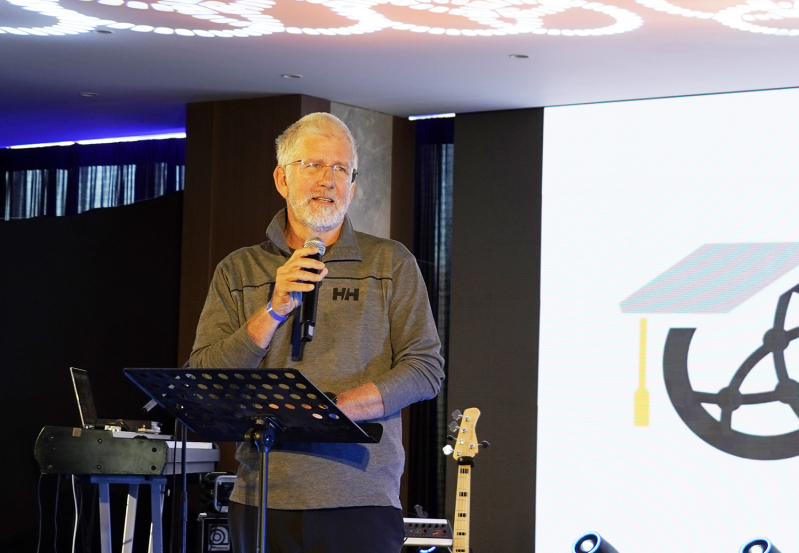
Dr. Marvin Oxenham believes the future of theological education must not only rest on academic excellence or professional competence but also on something more personal and transformative: the character of those preparing to serve in ministry.
In the second part of his interview with Christian Daily International, conducted during ICETE’s 19th Global Consultation in Tirana, Albania, Oxenham explained why recovering the Christian tradition of character and virtue education is vital not just for theological schools but for churches, families, and Christian discipleship as a whole.
Oxenham serves as secretary-general of the European Council for Theological Education (ECTE) and directs the ICETE Academy, an online training platform for theological educators worldwide. Based in Rome, he has devoted decades to church planting, evangelism, and educational leadership. In recent years, however, his research and writing have increasingly focused on how Christians can recover a robust understanding of virtue and develop practical tools for shaping character in the context of theological training.
For Oxenham, the emphasis on character is not a side issue but central to the credibility and health of Christian witness. He observed that most of the problems faced by churches and ministries are not rooted in doctrinal error or lack of technical skills. Instead, they arise when leaders and members alike fail in matters of integrity, humility, and moral courage.
“It’s usually the issues of character and who we are as people that are the most important,” he said. “If you think about problems that can happen in a church or Christian organization, they’re rarely related to bad doctrine or poor abilities. Many, many times they’re related to character. And even our witness in the world — if we are not also good news people in who we are, then the message we bring doesn’t match the lives that we’re living.”
This recognition has fueled his commitment to help theological educators rediscover the neglected tradition of virtue and character education and to develop concrete strategies for putting it into practice.
Rediscovering a neglected tradition
Although the language of “virtue” has largely fallen out of use in modern discourse, Oxenham stressed that it was once central to the Christian Church for millennia. He noted that across cultures and traditions, from ancient philosophy to Christian theology, cultivating virtue has always been regarded as essential for personal and communal flourishing.
“My passion is to encourage theological educators, both formal and non-formal, to rediscover this tradition of character and virtue education and the tools to do it,” he said. “Oftentimes there is good intention — yes, we want to shape character — but when you ask, ‘How do you actually do it?’ the tools and training are missing.”
To address this gap, Oxenham has written extensively. His first book laid out the vision and background, weaving together historical, theological, philosophical, and educational dimensions of character education. But theory alone was not enough, he realized.
“The second book is a practical handbook because I understood that many people, especially those in leadership or education, are already overwhelmed with responsibilities,” he explained. “They may agree that character formation is important but ask, ‘How do I actually put this into practice?’”
That realization led him to design a 24-week plan that can be used in multiple settings — from individual devotional life to family discipleship, small group study, church programs, and formal theological courses. The plan provides concrete steps for cultivating specific virtues and developing habits that support long-term growth.
When pressed to summarize how character is formed, Oxenham resisted reducing it to a simple formula, but he offered a three-part framework: character must be sought, taught, and caught.
Sought: Formation must be intentional. Without deliberate planning, character education is quickly sidelined in favor of academic or administrative priorities. “It doesn’t just happen on its own,” he said.
Taught: Students need to understand what virtue is, how it is defined, and how it can be pursued. But Oxenham warned against mistaking intellectual knowledge for actual transformation. “Teaching about sailing is not the same as learning how to sail,” he explained. “In the same way, being taught about character doesn’t mean you have been formed in character.”
Caught: Virtue is absorbed within community life. From ancient Athens to the early Church, societies have recognized that moral character is shaped through imitation, role models, friendships, the arts, and shared practices. “Christian communities need to be intentional spaces where virtue can be caught,” he emphasized.
This communal aspect, he added, includes the often-overlooked tool of habituation. Just as musicians repeat scales until they become second nature, Christians must repeatedly practice virtuous actions until they become part of who they are.
“If you want to be a person of compassion, begin doing acts of compassion — even if you don’t feel like it,” he said. “Over time, the act of the will becomes part of your character, and compassion comes naturally. That is when you can say character has truly been shaped.”
Prudence: a misunderstood and undervalued virtue
Asked which virtues are most needed today, Oxenham declined to rank them universally, arguing that the answer depends on context. However, he highlighted prudence — one of the four cardinal virtues in Christian tradition — as widely misunderstood and undervalued.
“Most people think prudence means being careful when you walk down the steps,” he said. “But it is much deeper — a form of wisdom in practical judgment and decision-making. It is one of the most important virtues and one that is often neglected.”
To explore how virtues are expressed in different cultures, Oxenham developed a virtue test — a 150-question survey similar to a personality assessment, but focused on moral traits. More than 16,000 people worldwide have taken the test, allowing him to analyze data across regions.
The results are telling. In Europe, for example, the lowest scoring virtue is courage. Other regions reveal different weaknesses and strengths, highlighting the contextual nature of character formation.
“There isn’t one single virtue that stands out everywhere,” Oxenham said. “It depends on the cultural and social setting. That’s why we need tools to help communities identify their strengths and weaknesses.”
Many theological students are looking for personal formation
Despite widespread talk about “holistic formation,” Oxenham has yet to encounter a theological school that has fully implemented an intentional plan for character and virtue education.
“I’ve been around and met many people,” he said. “But no one has ever come up to me and said, ‘Here, look at what we are doing. This is a comprehensive and intentional approach.’”
While mentoring programs and spiritual direction are common, he noted that institutions often blur the lines between spiritual formation and character formation. He sees them as overlapping but distinct, a topic he continues to research and present on at conferences like ICETE’s Global Consultation.
If institutions need more convincing, Oxenham points to the students themselves. In a Europe-wide survey of nearly 500 theology students, researchers asked why they were studying theology. Only a minority cited preparation for ministry or career goals. More than half said their main motivation was personal formation.
“That is a very strong reason,” he said. “Students are looking for formation. They may not use the word ‘virtue,’ but they know they want to be shaped.”
This, he argued, reflects a larger shift in education. With vast amounts of theological knowledge now available online, students turn to schools for something they cannot get elsewhere: relationships, guidance, and holistic development.
Balancing the table of holistic formation
For Oxenham, this is inseparable from the Church’s mission. “It is at the core of discipleship to shape people to be Christlike,” he said. “When we speak of holistic theological education, everyone agrees. But if we are doing mostly academics and ministry training while remaining weak in spiritual and character formation, then the table of holistic formation is unbalanced.”
He likened it to a table with uneven legs. Academic rigor and ministry competence may be strong, but if the legs of spiritual and character formation are weak, the table cannot stand steadily.
Ultimately, Oxenham sees character education not only as an academic project but as a theological mandate — a way of participating in God’s mission to shape His people into the likeness of Christ.
“It is about practicing the Sermon on the Mount, embodying the characteristics of Christ, and rediscovering the virtues that the Church has always valued,” he said.
Through his books, the ICETE Academy, and ongoing research, Oxenham hopes to equip theological educators, churches, and families with tools to make character formation a lived reality. For him, the credibility of Christian witness depends on it.
“If our institutions and communities can become places where virtue is intentionally cultivated,” he concluded, “then our message of good news will not only be proclaimed but also embodied in the lives we live.”






